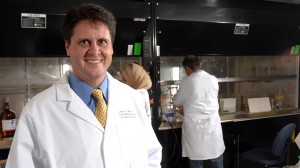
Stephen J. Cutler, chair of the Department of Medicinal Chemistry, is the principal investigator for UM's COBRE center. UM photo by Kevin Bain.
OXFORD, Miss. – The University of Mississippi and its School of Pharmacy have received a five-year, $10 million Centers of Biomedical Research Excellence, or COBRE, grant from the National Institutes of Health.
“This is an exciting time for the School of Pharmacy and the University of Mississippi,” said David D. Allen, the pharmacy school’s dean. “The COBRE grant will allow us to further our mission of researching natural products neuroscience. It is a wonderful acknowledgement of what we have achieved so far in our program.”
COBRE is one of the main components for NIH’s Institutional Development Award program, which is designed to broaden funding for biomedical and behavioral research. COBRE centers strengthen capabilities for biomedical research by developing related faculty research through support of a multidisciplinary center led by a principal investigator.
The grant is for the second phase of UM’s center, the Center of Research Excellence in Natural Products Neuroscience, or CORE-NPN, which was first funded as a COBRE center in 2006. CORE-NPN’s mission is to bring together a number of researchers with complementary backgrounds and skills to conduct investigations related to effects of natural products on the central nervous system.
“UM is committed to continually enhancing its biomedical research expertise and infrastructure,” said Alice M. Clark, vice chancellor for research and sponsored programs. “This project supports that goal by providing funds to help our researchers develop their ideas more fully and compete successfully for merit-based, peer-reviewed competitive funding from NIH and other major sponsors.”
The Institutional Development Award program is divided into three phases, with each phase requiring a competitive renewal. Each phase is a five-year award. The first phase consists of developing research scientists as well as research cores in the CORE-NPN. The second phase includes scientists, but focuses on further developing research cores. The third phase focuses on self-sustainability for the centers.
Stephen J. Cutler, chair of the medicinal chemistry department, is the principal investigator for UM’s program.
“In Phase I, we developed promising lead drug candidates for managing drug addiction and conducted preliminary preclinical studies on novel drug delivery technologies,” Cutler said. “Phase II will allow us to move these drug candidates and drug delivery systems through additional preclinical studies. Ultimately, the goal is to commercialize these discoveries to improve human health.”
The program provides assistance to many faculty members and researchers, said Charles D. Hufford, the pharmacy school’s associate dean for research and graduate programs.
“The most important aspect of the COBRE programs is to help faculty increase their competitive NIH research funds, which has been accomplished in Phase I,” Hufford said. “The program is monitored by both an internal and external advisory committee composed of NIH-funded senior investigators that provide critical guidance for the program. This has proved to be a beneficial aspect of the program, in addition to the financial resources provided to the researchers.”
“Phase I of the COBRE funding has significantly contributed to the development of our faculty and the advancement of science at the University of Mississippi,” Provost Morris H. Stocks said. “The funding of Phase II is substantial and will advance the university’s research infrastructure, create new research opportunities for our faculty and enhance the international reputation of our institution in the area of natural products neuroscience.
“We are indebted to Dr. (Stephen) Cutler for his outstanding leadership and management of this complex program and for his commitment to excellence in this important area of science.”
For more information about CORE-NPN, go to http://www.olemiss.edu/cobre/. For more information on programs in the UM School of Pharmacy, go to http://www.pharmacy.olemiss.edu/.
Research reported in this release was supported by the National Institute of General Medical Sciences of the National Institutes of Health under Award Number P20GM104932. The content is solely the responsibility of the authors and does not necessarily represent the official views of the National Institutes of Health.